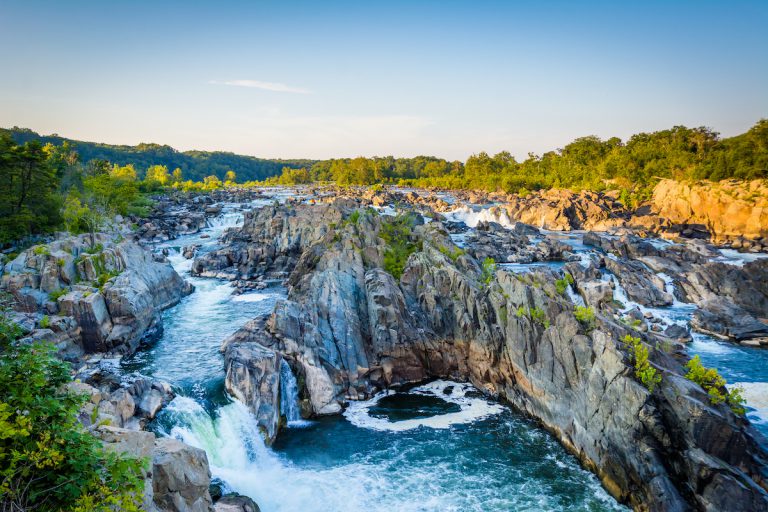
Virginia offers a combination of history and nature that makes an RV camping trip here an experience everyone can enjoy! Whether you want to stroll through a national park, or be near the nation’s capital or other big, historic cities, you can do both of those things here and more!
If you’re planning an RV camping trip to Virginia, this article can help you out! We’ll share where to stay, what to do, and what to see in this beautiful state.
Preparing for RV Camping
The first thing you’ll want to do when planning a Virginia RV camping trip is to make sure you’re prepared for the journey! In some areas of Virginia, you’ll be near plenty of stores with supplies, while other areas are much less populated.
You’ll also want to make sure your RV is ready to go! If you don’t have an RV, you can rent one at RVshare. You may want to research some tips and tricks for RV camping ahead of time as well.
Choosing the right RV for your needs
As you consider what kind of RV you should rent, you’ll want to think about what type of RV will best suit your needs on this trip. Think about how many people will be camping with you. If you’re going solo or with one other person, you may just need a campervan. If you’re traveling with a large group, you may need a Class A motorhome or fifth-wheel camper to accommodate everyone. You’ll also want to figure out how you’re getting around once you’ve set up camp. If you’re traveling in a Class A motorhome, you might need to tow a smaller vehicle behind. A trailer allows you to use the towing vehicle once you’ve set the trailer up at the campsite. A campervan is small enough that you can use it as your vehicle and just bring it back to camp each night to sleep in. When you’ve figured out a few basic parameters, you can use RVshare to search for RVs and filter them according to price, available dates, type of vehicle, even by pet-friendliness.
Packing essentials for a successful trip
It can be overwhelming to consider everything you need for an RV camping trip! Making a packing list for the trip can be a huge help in getting organized. You may also want to make two lists – one for the personal items everyone needs and one for the items you need for the RV.
Personal Packing List:
- Clothing – be sure to pack enough for your trip, or enough for between laundry days
- Toiletries
- Medications
- Bug spray or citronella candles
- Sunscreen
- First Aid kit
- Outdoor recreation clothing (hiking boots, bathing suit, or other specialized clothing)
- Winter or summer accessories (winter hats, gloves, sun hat, etc)
- Flashlight
- Entertainment (books, games, movies)
- Extra batteries
- Groceries
- Electronics & chargers
- Pet supplies
- Quarters for showers or laundry
You’ll also want an RV packing list to help you decide what to pack. Be sure to check what’s included with your RV rental as you plan. Some RVs include items like dishes, linens, and even outdoor equipment while others do not. You’ll want to make sure the following items are either included in your rental or packed to bring along.
RV Packing List:
- Pots & pans
- Dishes
- Utensils – don’t forget a can opener, bottle opener, spatula, set of knives, etc.
- Dish towels & sponges
- Sheets & pillows
- Bath Towels
- Tool kit
- Folding camp chairs
- Blankets
- RV leveling blocks
- Sewer hose and adapter
- Freshwater hose
- Surge protector
You’ll also want to tailor this list to where you’re camping and the time of year. You can consult our RV Checklist to make sure you don’t forget anything for your trip.

Considerations for Camping in Virginia
Virginia is a beautiful place to camp, with lots of places to explore. In summer, parts of Virginia can get humid and muggy. If you’re outdoors, make sure you drink plenty of water throughout the day. Stop your exercise if you begin to feel fatigued. Winters in Virginia can be very cold, so bring plenty of layers. Dress warmly, and make sure your RV is ready for winter if you plan to camp then.
While camping in Virginia, you’ll also want to know the laws for RVs in the state. Each state has its own laws pertaining to RVs, and you’ll need to know what those are to avoid a ticket.
In Virginia, the maximum RV width is 102 inches. The maximum motorhome length is 45 feet. The maximum trailer length is 45 feet and the maximum height for an RV is 13 1/2 feet. The maximum combined length for a two-vehicle combination is 65 feet. Passengers are allowed to ride in truck campers. RVs are allowed in carpool lanes if they have three or more occupants.
As far as general driving rules in the state, a right turn is allowed at a red light unless otherwise noted. Your lights must be on when your wipers are on. Front-seat passengers are required to wear a seat belt, and children up to 5 years old must be in child-restraint safety seats. Radar detectors are not permitted in Virginia.
Researching campground options and making reservations
When you begin looking for campgrounds in Virginia, you’ll want to start your research by thinking about where you want to visit in the state. Virginia has lots of different areas, from historic sites to mountain activities, to coastal fun and there are campgrounds near each of these attractions.
Once you’ve decided where you want to visit, you can begin to search for particular campgrounds where you can stay. There are a few websites that can help you find campsites and where you can book reservations online for your trip. Hipcamp, The Dyrt, and Roverpass are all good websites to help you find a campsite. KOAs are a great option for families. Harvest Hosts offer unique campsites on the grounds of farms, wineries, and other scenic places.
Finding Campgrounds
You’ll want to make sure you have a campground reservation, especially if you’re traveling during a popular time of year when kids are on break. Fortunately, there are many Virginia campgrounds to choose from! Whether you plan on luxury camping, urban camping, or heading into the wilds, you’ll find a campground to suit you.
Exploring public campgrounds in the state
Public campgrounds in Virginia include campgrounds at national and state parks, in national forests, and in other areas. They tend to have fewer amenities than private campgrounds, but they also tend to be cheaper.
National Park Camping
Virginia has one national park – Shenandoah National Park. However, the state also has other national historic trails, battlefields, historic sites, and more. Here are some of the sites run by the National Park Service:
- Appalachian National Scenic Trail
- Appomattox Court House National Historical Park
- The Arlington House and Robert E. Lee Memorial
- Assateague Island National Seashore
- Blue Ridge Parkway
- Booker T Washington National Monument
- Cape Henry Memorial at Colonial National Historical Park
- Captain John Smith Chesapeake National Historic Trail
- Cedar Creek & Belle Grove National Historical Park
- Cumberland Gap National Historical Park
- Fort Monroe National Monument
There are even more national sites in Virginia for you to explore! Some of these sites have camping on the grounds of the site, and many more are close to campgrounds where you can stay.
National Forest Camping
If you want to camp in a forest setting, the George Washington and Jefferson National Forests cover areas of the Appalachian Mountains in Virginia, West Virginia, and Kentucky. You can hike, bike, stargaze, and fish in this amazing area, surrounded by trees and scenic mountain vistas.
State Park Camping
Another way to appreciate the beautiful areas of Virginia is by camping at a Virginia state park! Natural Tunnel State Park has a naturally formed cave that is so big, it’s used as a railroad tunnel. Smith Mountain Lake State Park is home to a lake that is the second-largest freshwater lake in Virginia. First Landing State Park is Virginia’s oldest state park and is named for the first English colonists who landed there in 1607.
Exploring private campgrounds and RV parks
While Virginia has lots of public campgrounds, there are also lots of private campgrounds as well! If you want lots of amenities and perks, glamping is a great way to go. Often, private campgrounds have more amenities in general than public ones, including things like restrooms with showers, electric and water hookups, and dump stations. Spacious Skies Shenandoah Views campground is nestled in farmland in the Blue Ridge Mountains. You can stay in one of their cabins, or use the RV park which has full hookup sites, pergolas, and pull-thru sites.
Boondocking in Virginia
If you’d like to really get away from it all, you can go boondocking in Virginia! Head to the Rapidan Wildlife Management Area near Shenandoah National Park for hunting, fishing, and hiking. The Pig Farm Campsite along the Appalachian Trail has to be hiked to, but rewards you with amazing views. Walnut Falls Campground in the George Washington & Jefferson National Forests is also near the Appalachian Trail. There’s fishing in Dismal Creek and the hike to Dismal Falls is worth it.
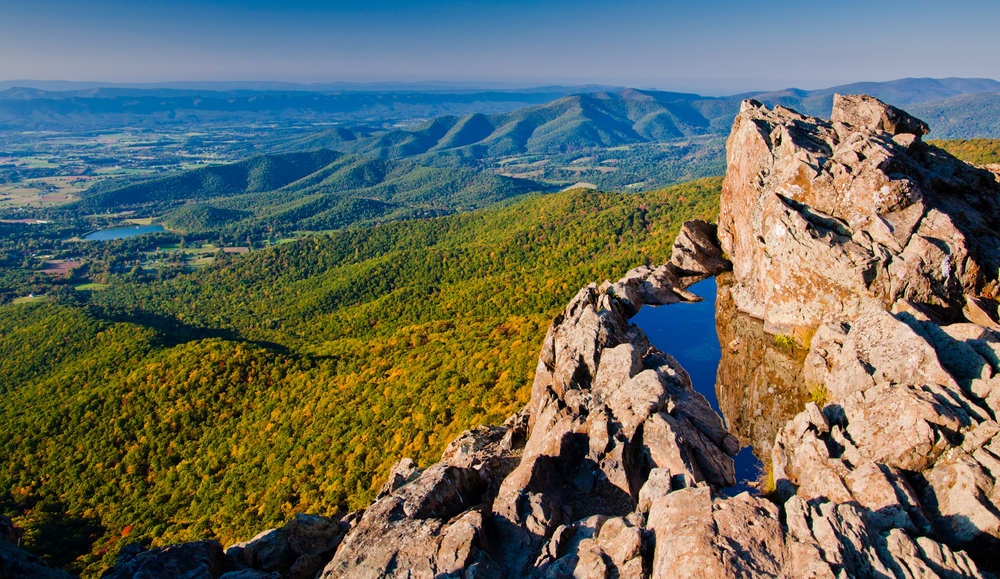
Planning your itinerary
By now, you probably have an itinerary in mind after researching RVs and campgrounds in Virginia! Now it’s time to finalize those plans. Whether you want an urban adventure or want to head to the backcountry, there’s plenty to do here.
Features and attractions in Virginia
One of the best ways to explore Virginia is by taking one of the state’s scenic byways! Skyline Drive runs the length of Shenandoah National Park and it’s a popular drive to look for wildflowers or fall colors. The famous Blue Ridge Parkway connects Shenandoah to Great Smoky Mountains National Park. The lower speed limit allows you to take your time winding through the beautiful mountains and forests. The Journey Through Hallowed Ground Byway is named after part of President Lincoln’s Gettysburg address, and connects several significant historic sites. It heads north from Virginia, into Maryland, before ending in Gettysburg, Pennsylvania.
There are also lots of Virginia landmarks to see! Mount Vernon, Arlington National Cemetery, and Manassas National Battlefield are historic sites that help visitors understand the history of the United States. You may also want to visit the national sites in Virginia on your journey.
Festivals, fairs, and events in Virginia
There are plenty of fun events in Virginia that you might enjoy visiting while you’re camping in the state! The State Fair of Virginia takes place each fall in Doswell. Catch a concert, down some fair food, and see the agricultural products of the area. You can camp right at the fairgrounds at Meadow Event Park.
Floydfest in Floyd, VA is five days of music at this venue along the Blue Ridge Parkway.
If you book your RV with RVshare, you might even be able to find an owner who will set your rig up on-site for you for an extra fee.
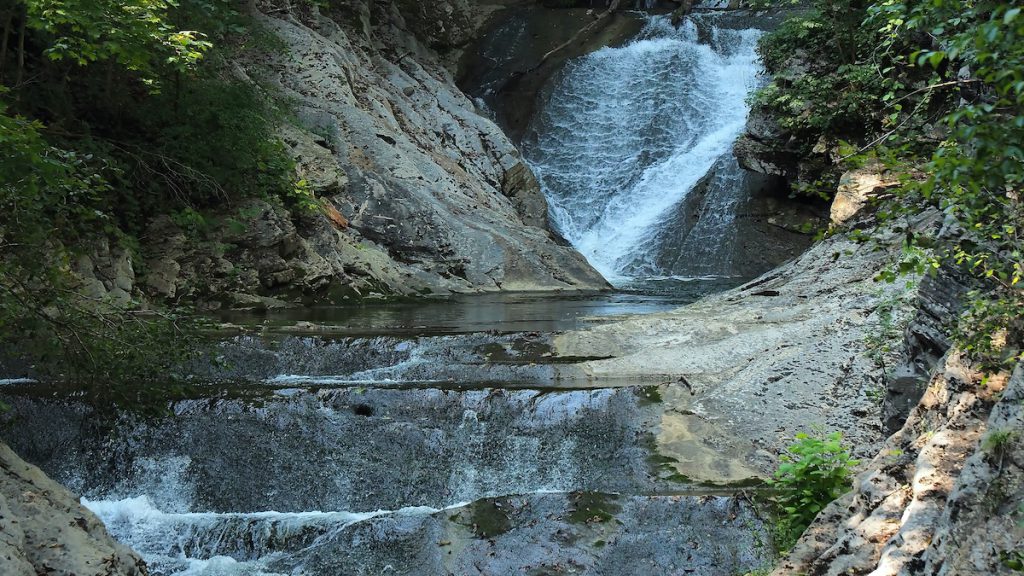
Exploring Outdoor Activities in Virginia
The national parks and mountains of Virginia mean it’s a great place for lots of outdoor activities! The state has beaches for surfing and beachcombing, rivers for paddling, mountains for hiking, and places for fishing. You might also see wildlife including the wild ponies of Chincoteague, bears, raccoons, white-tailed deer, bobcats, and more.
Hiking, biking, and nature trails
There are lots of great hiking trails in Virginia! Whether you want to explore Shenandoah National Park, one of the state parks, or other natural areas, there’s a hike for you here.
Some of Virginia’s best hikes include:
- Old Rag Mountain Loop
- McAfee Knob via Appalachian Trail
- Marys Rock via Appalachian Trail North Approach
- Dragon’s Tooth Trail
- Sharp Top Trail
If you prefer mountain biking to hiking, here are a few trails to try:
- Burke Lake Trail
- James River North Bank and Buttermilk Loop Trail
- Ragged Mountain Natural Area Trail
- Lake Accotink Trail
Fishing, boating, and water activities
Virginia has lots of different bodies of water, from the ocean to lakes, rivers, and streams throughout the state. The Virginia Seaside Water Trail is a 100-mile paddling trail. Richmond has the only urban setting for Class IV rapids in the U.S. There are lots of spots for fishing and boating as well.
Wildlife viewing and photography
You can see plenty of wildlife in Virginia as well! The ponies on Chincoteague Island swim each July from Assateague to Chincoteague and back again during a week of festivities. You’ll also find bears in the mountains of Virginia, along with deer and smaller animals like bobcats and raccoons.
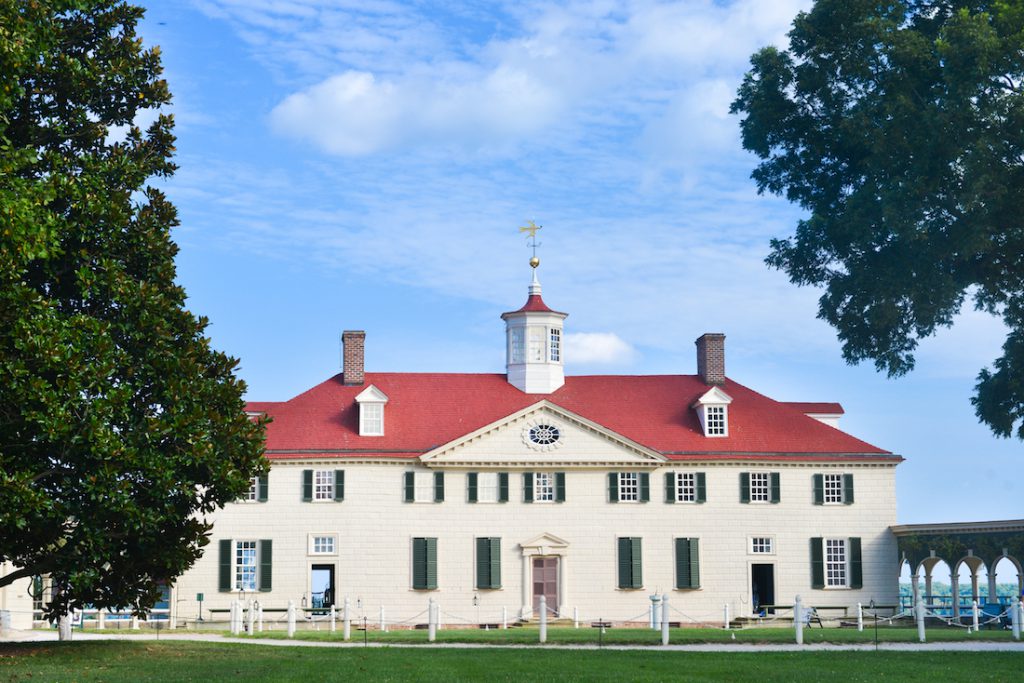
Family-friendly activities and attractions
If you’re traveling to Virginia with your family, there are plenty of activities for everyone! Get everyone outdoors, have an educational and historical day, or head to a local amusement park for fun! You can also explore cities like Williamsburg, Virginia Beach, and Chesapeake.
Historical sites and museums
Virginia is a state that is steeped in history! Visit historic presidential homes like Mount Vernon and Monticello or spend a day living in the 1700s in Colonial Williamsburg. Pay your respects to those who gave their lives for the country at Arlington National Cemetery. Finally, visit the Jamestown Settlement to learn about early United States history.
Amusement parks, zoos, and wildlife refuges
There are plenty of amusement parks in Virginia if you’d like to spend a day on thrilling rides. Kings Dominion and Soak City near Richmond combine two parks in one – an amusement park and a water park. There’s even a 4-D ride known as Jungle X-Pedition. Busch Gardens Williamsburg is a fun stop after a few educational days learning about the history of the area. The Pantheon is touted as the world’s fastest multi-launch roller coaster. You can enjoy the Busch Gardens Railway scenic train ride and the Skyride with the whole family.
If you want to look for wildlife, the Rappahannock River Valley National Wildlife Refuge is a great spot to watch for birds. The Eastern Shore of Virginia National Wildlife Refuge plays host to millions of songbirds, monarch butterflies, and raptors who all stop for a break on their journey south each year.
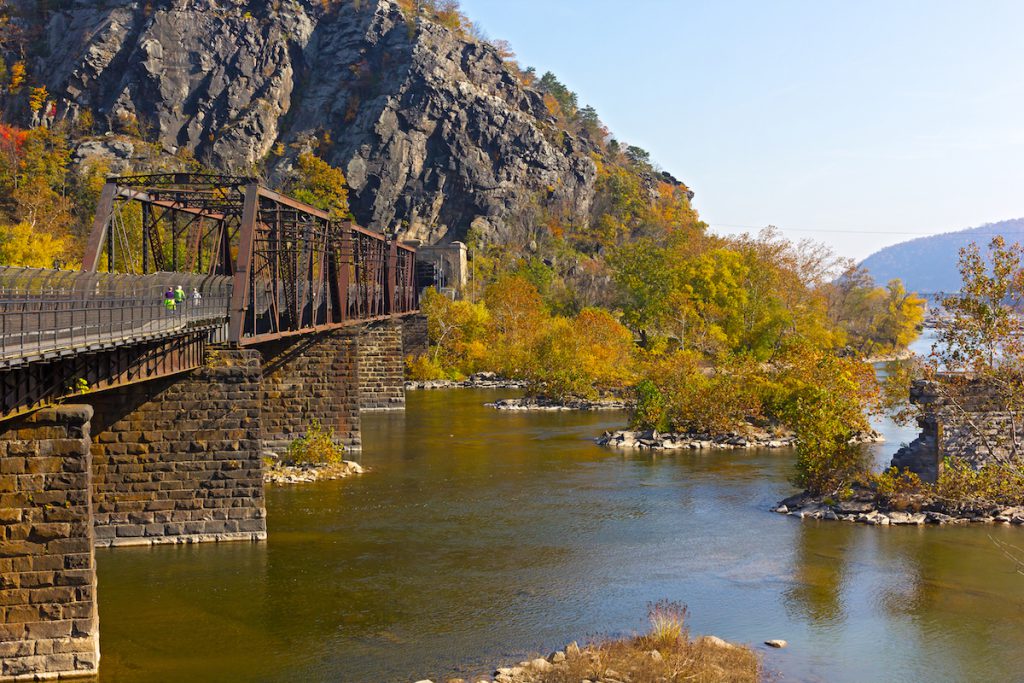
Safety and Preparedness when RV Camping in Virginia
Although Virginia is a wonderful place for an RV camping trip, you should be aware of the dangers of camping in the state. If you know the threats in the area, you can be better prepared and you’ll know what to do in case of an emergency.
Weather conditions and natural disaster preparedness
There are a few natural disasters and extreme types of weather that can pose a risk to camping in Virginia. The state has gotten floods, hurricanes and tropical storms, severe thunderstorms, tornadoes, and winter snowstorms. You should also be careful on extremely hot days.
If you encounter a flood, be careful while driving your RV. Flooded areas can be deceptive, and you can accidentally drive into a spot with more water than you thought. Be sure to head to higher ground during flooding. Listen to local radio or TV weather reports so you know if rain is continuing. You’ll also want to listen to whether your area needs to evacuate.
The best plan if your RV is in the path of a hurricane is to leave before the storm hits. If you can’t do that, get yourself to higher ground. Do not stay in your RV, and try to seek shelter in a more solid structure. Move away from the coast, and away from hillsides that can have landslides. Broken windows can be one of the biggest hazards in an RV during a hurricane, so be sure to stay away from windows and close the curtains to protect from broken glass.
Wildlife encounters and precautions
Virginia is home to a variety of wildlife! Be bear aware while you’re hiking, mountain biking, or otherwise enjoying the outdoors. Don’t let children or pets run ahead on trails. Read posted signs and follow the advice on what to do if you encounter a wild animal. Be careful even around smaller animals. Never feed or try to pet a wild animal. When you’re at your campsite, make sure you put away all food and scented items in a bear box or animal-safe container.
Virginia is a beautiful country of mountains that’s also steeped in history. There are many places to visit in the state that make a great Virginia camping trip and are sure to make memories!
More Inspiration for Your Virginia Travels
- Top 10 Amusement Parks in Virginia
- Urban Camping in Virginia
- Top 10 Waterfalls in Virginia
- Luxury Camping in Virginia
- Glamping in Virginia
- Fishing in Virginia
- Top 10 Beaches in Virginia
- The Top 38 Bucket List Destinations in Virginia
- Boondocking in Virginia
- Top 10 Landmarks in Virginia
- The 10 Best RV Trips to Take in Virginia
This post may contain affiliate links.
